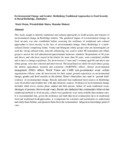Please use this identifier to cite or link to this item:
https://cris.library.msu.ac.zw//handle/11408/1970Full metadata record
| DC Field | Value | Language |
|---|---|---|
| dc.contributor.author | Matsa, Mark | - |
| dc.contributor.author | Matsa, Winniefridah | - |
| dc.contributor.author | Mukoni, Manuku | - |
| dc.date.accessioned | 2017-05-29T12:47:14Z | - |
| dc.date.available | 2017-05-29T12:47:14Z | - |
| dc.date.issued | 2017 | - |
| dc.identifier.isbn | 978-3-319-45646-1(print) | - |
| dc.identifier.isbn | 978-3-319-45648-5 (online) | - |
| dc.identifier.uri | http://hdl.handle.net/11408/1970 | - |
| dc.description.abstract | This study sought to identify traditional and cultural approaches to food security and features of environmental change in Beitbridge district. The gendered impact of environmental change on food security was also established before assessing the resilience of traditional and cultural approaches to food security in the face of environmental change. Since Beitbridge is a multi-cultural district comprising Suthu, Venda and Shangani ethnic groups who are intermingled yet each has strong cultural traits, network referencing was used to select 40 respondents per ethnic group to answer the self-administered questionnaire interview schedule. Respondents of 40 years and above, and who have stayed in the district for more than 30 years, were considered credible and to have a change experience. Six interviewees (3 men and 3 women) aged 60 and above per ethnic group, were also selected and interviewed. The kraal head (or chief) for each ethnic group, the district agricultural research and extension (AGRITEX) officer, district environmental management (EMA) officer, World Vision and CARE non-governmental social welfare organisation officers were all interviewed for their expert ground experience on environmental change, gender and food security in the district. Direct observation was used to ‘ground truth’ evidence of environmental change. Results indicated that traditional food sources in Beitbridge were diversified and divided into wild and domestic sources. Evidence of environmental change included silted rivers, extinct plant, animal and bird species, failure of some traditional crops, shortages of pastures, firewood and water. Results also indicated that communities believed that traditional methods to food security, which were gendered, were more reliable than modern ones. It is recommended that, given the resilience and faith that local communities have in traditional food and traditional food approaches, it is important for scientists and nutritionists to understand and study them further, and promote them from the communities’ indigenous knowledge point of view. | en_US |
| dc.language.iso | en | en_US |
| dc.publisher | Springer International Publishing | en_US |
| dc.relation.ispartofseries | Environmental Change and Human Security in Africa and the Middle East, Edited by Mohamed Behnassi;Chapter 15, p 305-326 | - |
| dc.subject | Environmental change | en_US |
| dc.subject | Food insecurity | en_US |
| dc.subject | Traditional approaches | en_US |
| dc.subject | Gender, indigenous knowledge | en_US |
| dc.title | Environmental change and gender: rethinking traditional approaches to food security in rural Beitbridge, Zimbabwe | en_US |
| dc.type | Book chapter | en_US |
| item.openairetype | Book chapter | - |
| item.languageiso639-1 | en | - |
| item.openairecristype | http://purl.org/coar/resource_type/c_18cf | - |
| item.cerifentitytype | Publications | - |
| item.grantfulltext | open | - |
| item.fulltext | With Fulltext | - |
| Appears in Collections: | Book Chapters | |
Files in This Item:
| File | Description | Size | Format | |
|---|---|---|---|---|
| Environmental Change and Gender.pdf | Abstract | 62.15 kB | Adobe PDF |  View/Open |
Page view(s)
80
checked on Apr 7, 2025
Download(s)
12
checked on Apr 7, 2025
Google ScholarTM
Check
Altmetric
Items in MSUIR are protected by copyright, with all rights reserved, unless otherwise indicated.



